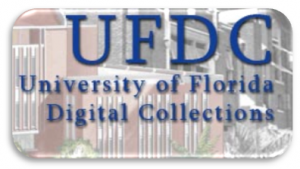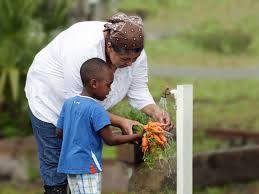Summer 2013 interns produced podcasts on a variety of topics related to the Farmworker Association of Florida. Image from the Farmworker Association of Florida Facebook.
University of Florida Digital Collections Archive
 To date, 50+ oral history podcasts are available on the University of Florida’s Digital Collections website, including final projects for the entire Spring 2011, 2013, Fall 2013, and Spring 2014 intern classes, as well as the Summer 2013 seminar and original SPOHP podcast series, released in 2009. Browse the following highlights for more information, and visit the UFDC to download the many available series.
To date, 50+ oral history podcasts are available on the University of Florida’s Digital Collections website, including final projects for the entire Spring 2011, 2013, Fall 2013, and Spring 2014 intern classes, as well as the Summer 2013 seminar and original SPOHP podcast series, released in 2009. Browse the following highlights for more information, and visit the UFDC to download the many available series.
To access information about individual podcasts, scroll through the UFDC collection. Podcasts below are from the Summer 2013 seminar class. Most podcasts are 15 minutes or less to facilitate easy access to local history for students, teachers, and the general public.
FAF-002, Johnnie Mae Byers (created by Tess Suhre-Korn) 4:47
Johnnie Mae Byers, born and raised in Apopka, Florida, was pulled out of school after the second grade to help support her family by working the muck farms and orange groves of the area. In this podcast, she discusses the harsh conditions of such work, including the physical strains of climbing, picking and carrying heavy loads, and exposure to both heat and pesticides. Interview conducted and podcasted by Tess Suhre-Korn.
FAF-003, Rossie Thomas (created by Chanelle Paul) 7:15
Because she and other African American children were bussed out of town for high school, Rossie Thomas’s schooldays ran from “‘dark-thirty’ to ‘dark-thirty’” leaving her to read tattered, hand-me-down textbooks and complete assignments by lamplight at night. In this podcast, Thomas discusses this period in her life as well as other experiences in education in the segregated South. Interview conducted and podcasted by Chanelle Paul.
FAF-005, Carol Johnson (created by Elaine Sponholtz) 9:59
Carol Johnson of the Farmworker Association of Florida grew up in Apopka, Florida and worked in the orange groves and packinghouses from fifth grade through her college graduation. In this podcast, she discusses migrant farm work, the health issues her mother and other farmworkers suffered from prolonged exposure to pesticides, dealing with segregation, and the important role education plays in transcending social and economic status. Interview conducted and podcasted by Elaine Sponholtz.
FAF-008, Geraldean Matthew (created by Michael Ruckstuhl) 7:19
Geraldean Matthew worked as a migrant farmworker throughout the United States before settling in Florida and landing a job as an advocate for farmworkers’ rights. In this podcast, she discusses advocating for better housing, better wages, and healthcare for farmworkers as well as a few of the troubles she has experience in trying to turn legislators’ attentions to farmworkers’ issues. Interview conducted and podcasted by Michael Ruckstuhl.
FAF-009, Earma Lee Carey Peterson (created by Daniel Nigel Frank) 5:18
Earma Peterson was born in Crescent City, Florida in 1930 and had 14 children and over 100 grandchildren. In this podcast, she describes her life working on the farms of Apopka, Florida in order to support her family and tells a little of the history of her grandfather, who was killed for building a school and a church for slaves. Interview conducted and podcasted by Daniel Nigel Frank.
FAF-010, Yesica Ramirez (created by Ekaterina Makovskaya) 5:47
Yesica Ramirez and her family moved to the United States in 2000 with the hopes of earning enough money to build a house to return to in their home town of Michoacán, Mexico. Yesica has been in the states ever since, isolated by language barrier to her job, family, and church. In this podcast, with the help of an interpreter, she describes her life in the United States, including this isolation, which extends even to her own children, as they know English, go to school, and bring back homework with which she cannot help them, as well as the lack of healthcare options facing immigrant workers. Interview conducted and podcasted by Ekaterina Makovskaya.
FAF-012, Robbert “Florida Bob” Griffin (created by McLane Edwards) 6:07
In this podcast, “Florida Bob” Griffin describes his life as a farmworker from Apopka, Florida. Topics include his blind father, who was nonetheless a successful crew leader, his childhood picking beans to help support his family and purchase school clothes, and his time moving between New York to pick apples and Florida to pick oranges. Interview conducted and podcasted by McLane Edwards.
FAF-013, Linda Lee (created by Brittany Nelson) 5:03
Linda Lee was born in 1952 and spent the better part of that decade and the next working on the farms of Apopka, Florida. In this podcast, she describes being caked in muck from muckstorms, the lack of drinking water on the job, being crop-dusted with pesticides while working, and a special project in which she creates memorial quilts chronicling the lives of those who have died to pesticide-induced illnesses. Interview conducted and podcasted by Brittany Nelson.
FAF-014, Betty Dubose (created by Clara Edwards) 28:25
Betty Dubose worked in the farms of Apopka from childhood until they closed in 1998. In this podcast, she describes the process of working with the other farmworkers and the adverse health effects she has suffered from being inundated with pesticides, including diabetes, back problems, and heart issues. Interview conducted and podcasted by Clara Edwards.
FAF-015, Marie Francois (created by Rebecca Minardi) 4:57
Marie Francois came to the United States from Haiti in 1997 with her husband and a medical degree. She did not pass the American medical boards, but found a new purpose in activism and educational outreach regarding AIDS and other sexually transmitted diseases. In this podcast, she describes her efforts to combat many of the myths and taboos surrounding STDs and to organize farmworkers and their children in the organization Students Against Drugs and Aids (SADA). Interview conducted and podcasted by Rebecca Minardi.
FAF-016 Fernando Cuevas, Sr. (created by Tariq Rahaman) 5:40
Fernando Cuevas, Sr. worked as a migrant farm laborer in Texas, Arkansas, Florida, Indiana, Ohio, and Michigan before becoming National Vice President of the Farm Labor Organizing Committee in 1979. In this podcast, he speaks about his life of fighting injustice, from the time his family had to stop him from assaulting a farmer who had kicked his grandfather on the job to organizing picket lines and marches throughout the Midwest. Interview conducted and podcasted by Tariq Rahaman.
FAF-017, Sister Gail Grimes (created by Sally Ince) 6:29
Sister Gail Grimes was born in Philadelphia and joined the religious community of the Sisters of Notre Dame de Namur after graduating high school. In this podcast, she describes being called to service in Apopka, Florida by the Orlando bishopric, the unique organization of the Sisters’ efforts in Apopka, and the main issues facing farmworkers, and African Americans in particular, throughout her time in Apopka. Interview conducted and podcasted by Sally Ince.
FAF-018, “Marvelous Rodgers: Migrant Child” (Brittany Hibbert) 4:54
Marvelous Rodgers grew up in Winter Garden, Florida. In this podcast, she describes the pressure her father, a fruit contractor, was under to clear the fields, the help she provided her father in his work, and the distaste for oranges a life of smelling them constantly might produce. Interview conducted and podcasted by Brittany Hibbert.
FAF-019, April Johnson (interview by Erin Conlin) 5:34
April Johnson was born in 1973 and grew up in Apopka, Florida. In this podcast, she describes her work in teen pregnancy prevention, STD prevention, prenatal care advocacy, and drug education outreach, as well as the specific challenges and approaches inherent in dealing with migrant farm laborers. Interview conducted by Erin Conlin.
FAF-021, Johanna Collins (created by Brant Snell) 4:45
Johanna Collins was born in Orlando, Florida but has lived in Apopka, Florida since moving there in the second grade. In this podcast, she describes her feelings of disappointment regarding the development of Apopka, as well as American society more generally. Topics include gun violence, “Stand Your Ground” laws, and education. Interview conducted and podcasted by Brant Snell.
FAF-022, “Mary Tinsley: Living With Lupus” (created by Adriano Gomes) 5:22
Mary Tinsley, the daughter of a migrant farm worker, was diagnosed with Lupus in 1994. In this podcast, Tinsley discusses living with an autoimmune disease, how her symptoms differ greatly from her sister’s, minority outreach efforts, and the likelihood that her mother’s constant exposure to pesticides over the years caused Tinsley’s Lupus. Interview conducted and podcasted by Adriano Gomes.
FAF-023, Mireya Ledesma (created by James Thompson) 5:21
Mireya Ledesma is one of eight children born to her farm laborer parents. In this podcast, she describes being looked down upon by other children for her parents’ occupations, the strange mix of shame and pride she felt in reaction, the responsibility she felt as the oldest daughter to help raise her younger siblings, and the ways in which farmworkers’ poor educations and the lack of informational outreach sometimes make it difficult for them to link health issues to pesticide exposure. Interview conducted and podcasted by James Thompson.
FAF-024, Miguel Zelaya (created by Daniel de la Rosa) 5:00
Miguel Zelaya is a veteran farmworker and pesticide safety instructor for the Farmworkers Association in Apopka, Florida. In this mostly Spanish-language podcast, Zelaya discusses how his personal experiences with toxic exposure in the workplace has inspired his career in workplace education, the direct links between income and education and access to healthcare and fair working conditions, and how the struggle for farmworkers’ rights is deeply related to the larger immigrants’ rights movement in the United States. Interview conducted and podcasted by Daniel de la Rosa.
FAF-025, “Leroy Bell: Environmental Racism and the Survival of the Racial Divide” (created by Clay Robinson) 9:34
In this podcast, activist Leroy Bell argues that four landfills, a sewage treatment plant, and a medical waste treatment plant are ravaging the environment and population of Apopka, Florida, and, importantly, that there are deep ties between the placement of these environmental offenders and the large concentration of African Americans in Apopka. Bell hopes that by illuminating the links between medical issues, including learning disabilities, low birth weight and high infant mortality, cancer, bronchitis, and heart failure, quality of life issues such as the constant and oppressive presence of insects and the overwhelming stenches associated with landfills and treatment plants, and a seemingly racist disregard for the wishes of the African American community in Apopka, he can draw enough public awareness to spur changes on the political level. Interview conducted and podcasted by Clay Robinson.
For more information about the podcast series, University of Florida Digital Collections, and more, please contact the Samuel Proctor Oral History Program .
